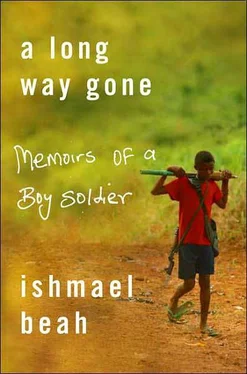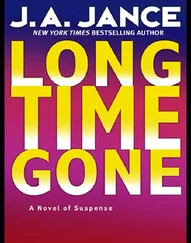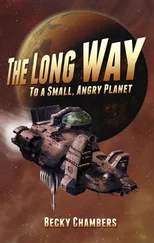We had traveled for more than six days when we came in contact with a very old man who could barely walk. He sat on the verandah of a house in the middle of the village. His face was too wrinkled to still be alive, yet his dark skin was shiny and he spoke slowly, gobbling the words in his jaws before he let them out. As he spoke, the veins on his forehead became visible through his skin.
“Everyone ran when they heard of the ‘seven boys’ on their way here. I couldn’t run at all. So they left me behind. No one was willing to carry me and I didn’t want to be a burden,” he said.
We explained to him where we were from and where we wanted to go. He asked us to stay for a while and keep him company.
“You young fellows must be hungry. There are some yams in that hut over there. Can you boys cook some for me and yourselves?” he politely asked. When we were almost finished eating the yams, he said slowly, “My children, this country has lost its good heart. People don’t trust each other anymore. Years ago, you would have been heartily welcomed in this village. I hope that you boys can find safety before this untrustworthiness and fear cause someone to harm you.”
He drew a map on the ground with his walking stick. “This is how you get to Yele,” he said.
“What is your name?” Kanei asked the old man.
He smiled as if he knew that one of us would ask this question. “There is no need to know my name. Just refer to me as the old man who got left behind when you get to the next village.” He looked at all our faces and spoke softly, with no sadness in his voice.
“I will not be alive to see the end of this war. So, to save a place in your memories for other things, I won’t tell you my name. If you survive this war, just remember me as the old man you met. You boys should be on your way.” He pointed his staff toward the path that lay ahead of us. As we walked away, he erased the map with his foot and waved us off with a raised right hand and a nod. Before the village disappeared from our sight, I turned around to take one last look at the old man. His head was down and he had both hands on his staff. It was clear to me that he knew his days would soon be over, and he didn’t bother to be afraid for himself. But he was for us.
Someone had started a rumor about the “seven boys,” us. Many times during our journey we were surrounded by muscular men with machetes who almost killed us before they realized that we were just children running away from the war. Sometimes I looked at the blades of the machetes and thought about how much it would hurt to be chopped with one. Other times I was so hungry and tired that I didn’t care. At crowded villages where we sometimes stopped to spend the night, the men stayed up to keep an eye on us. When we went to the river to wash our faces, mothers would grab their children and run home.
ONE MORNING,immediately after we had passed a deserted village, we started hearing something like the roar of big engines, the rolling of metal drums on a tar road, a thunder exploding, roll after roll. All these sounds reached our ears simultaneously. We hurriedly deviated from the path, running into the bushes and lying on the ground. We searched one another’s faces for an explanation of this strange sound. Even Kanei, who sometimes had answers, couldn’t tell us what we were hearing. We all looked at him and his face contorted with confusion.
“We have to find out what it is or we can’t continue on to Yele,” Kanei whispered, and then began to crawl toward the sound. We followed him, quietly dragging our bodies on rotten leaves. As we got closer, the sound intensified and a heavy breeze shook the trees above us. We could clearly see the blue sky, but nothing else. Kanei hesitantly sat on his heels and surveyed the area.
“It is just water, lots of it, and sand, lots of it.” Kanei was still looking.
“What is making the noise, then?” Alhaji asked.
“All I am looking at is water and sand,” Kanei replied, and then waved us to come closer and take a look. We sat on our heels for a while, looking in different directions, trying to locate what was making the sound. Without saying anything to us, Kanei crawled out of the bushes and started walking on the sand, toward the water.
It was the Atlantic Ocean. The sounds we had heard were those of the waves hitting the shore. I had seen parts of the ocean but had never stood at the shore of one this vast. It spread out beyond the vision of my eyes. The sky was at its bluest and seemed to curve down and join with the ocean in the distance. My eyes widened, a smile forming on my face. Even in the middle of the madness there remained that true and natural beauty, and it took my mind away from my current situation as I marveled at this sight.
We walked closer and sat at the edge of the sand and stared at the ocean, admiring the display of the waves in succession. They came in three folds. The first was small but powerful enough to break a person’s leg. The second was high and more powerful than the first, and the third was a spectacle. It rolled and rose higher than the shoreline as it moved forward. We ran away from where we sat. The wave hit the shore so hard that it sent sand particles flying high up in the sky. When we went back to look, the waves had thrown out unwanted flotsam from the ocean, including some big crabs that I guess weren’t strong enough to cling to the ocean floor, but they were still alive.
It was a calm walk along the sand, since we didn’t expect trouble in this part of the country. We chased and wrestled each other in the sand, played somersault and running games. We even bundled up Alhaji’s old shirt and tied a rope around it to make a soccer ball. We then played a game, and each time one of us scored a goal, he would celebrate with a soukous dance. We shouted, laughed, and sang our secondary-school songs.
We started walking on the sandy beach early in the morning and saw the sunrise. At midday we saw a cluster of huts ahead and raced each other toward them. When we arrived there, we suddenly became worried. There was no one in the village. Mortars lay in the sand, rice spilling out of them; jerry cans leaked water, and fires were left unattended under cooking huts. Our first guess was that the rebels might have been there. Before we could think of anything else, fishermen sprang from behind huts with machetes, fishing spears, and nets in their hands. We were so shocked by this sudden uproar that none of us was able to run. Instead, we shouted, “Please, we are harmless and just passing by,” in every possible one of the eighteen local languages that each of us knew. The fishermen jabbed us with the flat edges of their weapons until we fell on the ground. They sat on top of us, tied our hands, and took us to their chief.
The villagers had heard a rumor that some young people, believed to be rebels, were heading their way. Upon hearing this, they had armed themselves and hid, waiting to defend their homes and protect their families. This should not have been a big shock to us, but we didn’t expect it to happen here, since we thought we were now far from harm. They asked us several questions along the lines of where were we from? where were we going? and why did we choose that direction? Alhaji, the tallest among us and sometimes mistaken for the oldest, tried to explain to the chief that we were just passing by. Afterward, the men yanked our torn crapes off our feet, untied us, and chased us out of their village, waving their spears and machetes, and screaming after us.
We didn’t realize what sort of punishment the fishermen had given us until we stopped running away from their village. The sun was in the middle of the sky, it was over 120 degrees, and we were barefoot. The humidity by the sea was less than inland, but since there were no trees to provide shade, the sun penetrated right into the sand, making it hot and loose. Walking barefoot on the sand was like walking on a hot tar road. The only escape from this pain was to keep walking and hope for something miraculous. We couldn’t walk in the water or the wet sand near its edge. It was very deep between where we walked and where the water met the land, and the waves were dangerous. After I had cried for several hours, my feet became numb. I continued walking but couldn’t feel the soles of my feet.
Читать дальше












